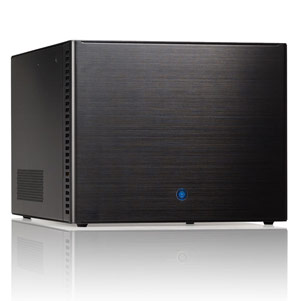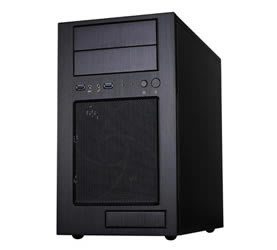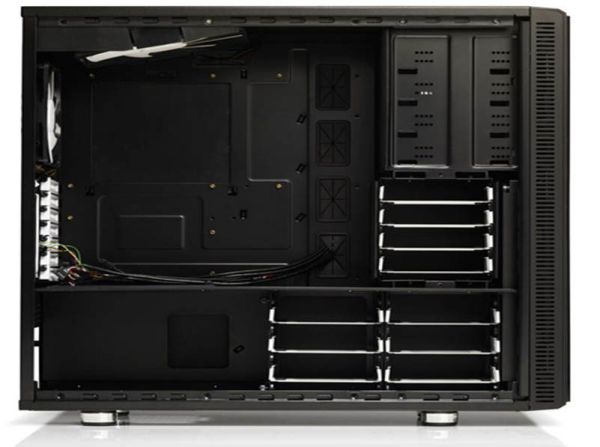File Server Builder's Guide
by Zach Throckmorton on September 4, 2011 3:30 PM ESTAs motherboard layout is important in ensuring that airflow is as unobstructed as possible, case design is also critical in facilitating excellent airflow. If you're building a system with one or two hard drives, most cases work fine for a home file server - just make sure there is a fan near the hard drive(s) so it is not sitting in stagnant air. However, if your server requires multiple disks, here are a few cases that work especially well for file servers.
Mini-ITX

Fractal's Array R2 is a nearly perfect home file server case. At less than 14" deep by 10" wide by 8" tall, it occupies little volume. It positions a removable hard drive cage immediately behind a quiet yet powerful 140mm intake fan. The hard drive cage accommodates up to six hard drives using vibration-dampening silicone mounts, and there is also room for a 2.5" drive (either an SSD or HDD). According to my testing, when stuffed with six low-rpm 2TB mass storage HDDs and one SSD (with an Intel Pentium G620 CPU installed), the temperatures of the HDDs hover around 40C even when all drives are under artificial sustained load (using Iometer). The PSU is a custom SFX form factor model, 80+ efficiency 300W unit with ample amps on the split 12V rail to power six HDDs. The PSU features seven SATA connectors and one legacy molex connector, so there are no extraneous molex plugs and enough SATA plugs. Furthermore, the cables are shorter than typical, so excessive cabling does not interfere with airflow. The case itself is constructed of aluminum so it is lightweight, and its overall build quality is very high. It does not have room for an optical drive, but I consider optical drives superfluous for a home file server. If necessary, you can always hook up a USB interface external optical drive. The only drawback of this case and its PSU is the price: at just under $200, it is not cheap. However, the subjective aesthetics, objective functionality of the case and the custom PSU are worth the cost if you want a small but capacious home file server case.
Micro-ATX

As I prefer home file servers that take up as little space as possible, Silverstone's TJ08B-E is a great, smaller micro-ATX minitower. It's less than 16" deep, 9" wide, 15" tall and weighs less than 12 pounds. It can accommodate up to five HDDs plus one SSD. As with the Fractal Array R2, the hard drives are placed immediately behind a front intake fan - though in this case, it's an even larger 180mm unit. The TJ08B-E is flexible in that it can hold a couple optical drives as well as a GPU in case you want to repurpose or multipurpose it. When stuffed with four low-rpm green drives, the temperatures under load don't exceed 45C during sustained transfers. Overall build quality is very good, like most Silverstone cases.
Silverstone makes a diminutive, fully modular PSU that makes working with smaller cases like the TJ08B-E, Lian Li PC-Q08, and others much easier. Silverstone also offers a short cable kit, making the ST50F-P PSU even better suited to SFF cases. Finally, it's clear that Silverstone had smaller multi-HDD systems in mind when designing the CP06 SATA power plug extension cable. This extender connects to a single SATA power plug and then has four SATA power plugs that are spaced closer than usual together, further reducing cable clutter. Though the cost of these accessories adds up, they make an ideal cabling solution very easy to implement. Regardless of whatever PSU you decide to go with, if you use a split 12V rail model, make sure you don't load up one rail with HDDs. If you go with a single 12V rail model, you'll want that rail to be beefy - for example, don't try to put ten HDDs and four case fans on a budget PSU with a 20A 12V rail.
Full Tower
Very few cases can accommodate ten HDDs at stock (without adding adapters), and such cases are not at all small. Full towers also typically offer excellent airflow, and cable management is not very difficult. Fractal's Define XL is one of the least expensive 10 HDD bay full tower cases available. It is well-built, and extra care has been paid to making the case quiet in the form of panel insulation. It is impossible to hear active HDDs inside this case even when you're sitting just a few feet from it (even the notoriously loud VelociRaptors). Further, there are plenty of integrated niceties like adjustable/flexible cable baffles that assist in cable management. Seven of the ten HDD slots are immediately behind fans, with three slots one cage removed from the front intake fans. Even still, the HDDs that aren't right behind the fans stay cool (between 35C and 40C). At around $150, it is an excellent value. Just make sure you don't pair it up with Silverstone's short cable kit!
We've saved the most important aspect of a home file server - the hard drives - for the next and last component page.











152 Comments
View All Comments
jtag - Monday, September 5, 2011 - link
Exactly so: hdparm --make-bad-sectorThis is "Exceptionally dangerous. Do not use this option!!" according to the man page, which goes on to say "This can be useful for testing of device/RAID error recovery mechanisms."
pvdw - Sunday, September 4, 2011 - link
The best case I've found for a 4+ HDD SFF home server is the Lian Li PC-Q08. For me sound and size are most important.http://www.silentpcreview.com/Silent_Home_Server_B...
BTW, Linux has some significant advantages over WHS when used for more than just a file server. But I'll leave those for you look up.
pvdw - Sunday, September 4, 2011 - link
BTW, I forgot to mention some things about my configuration.Linux RAID-1+0 far copies
Automated local backups using hard-links
Auto-rotation of backups
Auto-rsync to single remote backup
VPN Server (not finished setting up yet as has become a lower priority)
Print Server
Torrent server (Transmission)
Webserver (web dev environment)
SSH
Most of that is more than you'll need, but I'd definitely recommend at least RAID1 and auto-backups for a file server.
bobbozzo - Wednesday, September 7, 2011 - link
A hard-link 'backup' won't protect you if the file is modified or corrupted.jacob733 - Sunday, September 4, 2011 - link
I set up a fileserver system based on H67 some time ago. Turns out there is a bottleneck somewhere so the SATA throughput is shared between multiple channels. When filling all the channels with magnetic storage, the total throughput is much lower than expected. My old NForce4-based system is actually much faster in this test, but it only supports 4 SATA channels so I can't use it for this.Perhaps Anandtech could add a test that fills all the SATA channels instead of just putting a single SSD on the first channel?
I would also like to warn about stuffing more than 5-6 disks into the same case. Putting more disks in there will take the combined startup current to the extreme, which will seriously reduce the PSU lifetime. Also, it doesn't help to get a larger PSU for this, since these PSUs are segmented, and all the extra wattage goes to support extra graphics cards and perhaps a large CPU, while the rails used for disks are kept fairly constant.
Whenever I have had a HDD crash in a system with many disks, I have later been able to track it to voltage fluctuations due to a dying PSU.
/Jacob
pvdw - Sunday, September 4, 2011 - link
Hard drives use the 12V line(s), which are the same ones used by graphics cards. Western Digital Green 2TB drives (WD20EARX), use a peak of 1.75A each. So you won't exceed the 20A+ current supplied by a good PSU.The biggest problem is that so many PSUs are rubbish!! Since most customers look at wattage and not the build quality of a PSU, they're conned into buying the wrong one. A good quality 300W PSU would easily run a 6-disk home server. I'd recommend something like the Seasonic S12II or M12II, or the Nexus Value 430.
Powerlurker - Monday, September 5, 2011 - link
The problem is that it's virtually impossible for a consumer to assess the build quality of a PSU before buying it.bigboxes - Monday, September 5, 2011 - link
Yup. I use a Seasonic S12 430 to power my 9 drive file server. Rock solid. Runs 24/7. Got tired of having HDDs die due to the bad PSU so I invested in a quality one. I also use a APC 1250VA UPS as well to add to the system's reliability.Iketh - Sunday, September 4, 2011 - link
you know, reading through these comments, I'm liking my idea more and more...use a cheap laptop and daisy chain the hell out of 2.5" hdds... yea
Iketh - Sunday, September 4, 2011 - link
excuse me, I should clarify that by daisy chain = powered hub